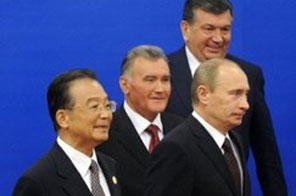Central Asia regional group meets on financial crisis
BEIJING: The leaders of Russia, China and four Central Asian nations met here Wednesday for talks that officials said would focus on counter-terrorism and a regional response to the global financial crisis.
Russian Prime Minister Vladimir Putin, host Chinese Premier Wen Jiabao, and leaders from four ex-Soviet countries Kazakhstan, Kyrgyzstan, Tajikistan and Uzbekistan -- gathered for the Shanghai Cooperation Organisation (SCO) meeting.
Representatives from India, Iran, Mongolia and Pakistan also joined the regional grouping's talks at Beijing's Great Hall of the People, as the four countries have SCO observer status.
Ahead of the talks, Chinese Vice Foreign Minister Wang Guangya said the fallout from the global economic meltdown, efforts to combat terrorism and the conflict in Afghanistan would be top the agenda.
"Confronted with these new problems, new threats and new challenges, the SCO members have realised that they could reduce the impacts to the utmost extent only through unity and self-improvement," state media quoted Wang as saying.
"The SCO members will enhance their determination to jointly fight against terrorism during this meeting," Wang said, according to the Xinhua news agency.
The Russian government said at the weekend that the leaders would adopt an "important document" on joint efforts to combat the effects of the global financial crisis, without giving details.
The SCO grew out of a regional effort in the mid-1990s to reduce military forces among common borders. It later came to involve anti-terrorism efforts and cooperation in the economic and energy fields.
Some Western critics say the grouping, dominated by Moscow and Beijing, is ultimately aimed at countering US influence in Central Asia.
Putin, who arrived here earlier this week, on Tuesday said Russia and China could better help solve global problems when they adopted a common stance.
"The joint positions of Russia and China on some or other issues somewhat contain some of our colleagues, colleagues who are more hot-headed than we are," he said, without pointing a finger at specific countries.
Putin did not elaborate, but Russia and China have been reluctant to support tougher sanctions against Iran over its disputed nuclear programme.
"Both China and Russia conduct peaceful, peace-loving foreign policy. We are not fighting wars anywhere, we don't have our troops abroad."
"It is a consolidated view towards these problems, an ability to agree the positions on key issues of global development that very often calm down the situation, so to speak -- play a stabilising role."






